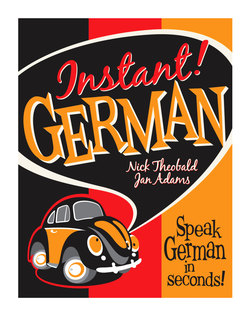Читать книгу Instant! German - Nick Ph.D Theobald - Страница 4
На сайте Литреса книга снята с продажи.
How our stupendously simple phonetics work.
ОглавлениеPlease read the following care-full-lee…
English: Sorry, my German is not very good.
German: Tut mir leid, mein Deutsch ist nicht sehr gut.
Phonetics: Toot mere light, mine Doytch ist nisht zeer goot.
Toot - what boats do
mere - a mere handful
light - the opposite of dark
mine - it’s mine, not yours
Doytch - kind of as you’d expect
ist - same sound as list
nisht - nish + a ‘t’ at the end
zeer - same sound as beer
goot - same sound as foot
English: What’s new?
German: Was gibt's neues?
Phonetics: Vass gibs noy-iss?
Vass - like pass
gibs - like ribs
noy-iss - noy + iss
English: How much please?
German: Was kostet ess bitte?
Phonetics: Vass cost-est ess bitter?
Vass - like pass
cost-est - cost + est
ess - same sound as less
bitter - as in bitter
English: Do you have an English menu?
German: Haben sie eine englische Karte?
Phonetics: Ha-ben zee eye-ner Englisher carter?
Ha-ben - Ha + ben
zee - as you’d expect
eye-ner - same sound as miner
Englisher - as you’d expect
carter - as in get carter
English: May I ask who’s calling?
German: Wer ist dort?
Phonetics: Vair ist dort?
Vair - same sound as fair
ist - like list
dort - like sort
Pronouncing the “Ich” word & other Teutonic technicalities
Ich is the first person singular in German.
Ich can be hard to pronounce, so we’ve cheated slightly and phoneticised it throughout as Ish. Ich and all German words with an ich or ch in them, are pronounced like the end of Bach. Ish is close enough, and in some parts of Germany, Ich is in fact pronounced as Ish.
• You’ll see that some phrases vary slightly when addressing friends, or strangers.
• We hyphenate many words so the the component parts are easier to sound out. Always run hy-phen-ated words together. OK?
